Aerothermodynamics and Fluid Mechanics
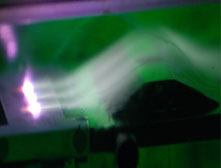
Aerothermodynamics and fluid mechanics involve study and research in experimental, theoretical, and computational aerodynamics; gas dynamics; turbulence; plasma dynamics; heat transfer; and combustion. Research topics include nonequilibrium and rarefied gas flows, turbulence control, shock-boundary layer interactions, thermal and glow-discharge plasmas, turbulent mixing/combustion, nonlinear flow interactions, and advanced optical diagnostics and sensors.
Computational Mechanics
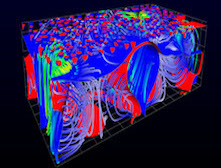 Computational mechanics involves study and research on theoretical and implementational aspects of numerical simulations. Applications span across all disciplines of mechanics and related coupled, multi physics problems, including computational solid mechanics, computational fluid mechanics and transport, semiconductor modeling, subsurface and surface flows, environmental modeling, computational wave propagation, bioinformatics and bioengineering, computational material science.
Computational mechanics involves study and research on theoretical and implementational aspects of numerical simulations. Applications span across all disciplines of mechanics and related coupled, multi physics problems, including computational solid mechanics, computational fluid mechanics and transport, semiconductor modeling, subsurface and surface flows, environmental modeling, computational wave propagation, bioinformatics and bioengineering, computational material science.
Controls, Autonomy and Robotics
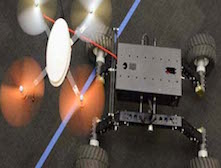 This area involves system theory, controls, networks, autonomy, and robotics with applications to the navigation, guidance, control, and flight mechanics of space, air, sea, and land based vehicles. Major research topics include onboard-optimal path-planning, differential games, hybrid-systems analysis, learning-based control, multi-vehicle coordination, swarm systems, vision and radio-based navigation, controlled-mobility wireless networks, and the study of human-robot interaction problems.
This area involves system theory, controls, networks, autonomy, and robotics with applications to the navigation, guidance, control, and flight mechanics of space, air, sea, and land based vehicles. Major research topics include onboard-optimal path-planning, differential games, hybrid-systems analysis, learning-based control, multi-vehicle coordination, swarm systems, vision and radio-based navigation, controlled-mobility wireless networks, and the study of human-robot interaction problems.
Orbital Mechanics
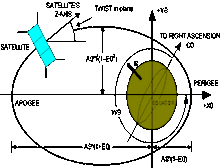 The study of and research in orbital mechanics involves the application of celestial mechanics, analytical dynamics, geophysics, numerical analysis, optimization theory, estimation theory, mathematics, and computer technology to model the dynamic behavior of natural and artificial bodies in the solar system. Applications include satellite positioning, tracking and instrumentation for Earth, ocean, atmospheric, and planetary science research.
The study of and research in orbital mechanics involves the application of celestial mechanics, analytical dynamics, geophysics, numerical analysis, optimization theory, estimation theory, mathematics, and computer technology to model the dynamic behavior of natural and artificial bodies in the solar system. Applications include satellite positioning, tracking and instrumentation for Earth, ocean, atmospheric, and planetary science research.
Solids, Structures and Materials
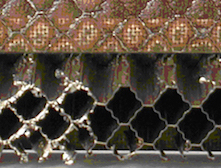 Study and research in solids, structures, and materials involves the mechanics of composite materials, fracture mechanics, nano and micromechanics of materials, constitutive equations, mechanical behavior at high strain rates, structural analysis, and structural stability. Experimental facilities include equipment for static uniaxial and biaxial structural testing; environmental chambers; and nano and microscale scale research devices.
Study and research in solids, structures, and materials involves the mechanics of composite materials, fracture mechanics, nano and micromechanics of materials, constitutive equations, mechanical behavior at high strain rates, structural analysis, and structural stability. Experimental facilities include equipment for static uniaxial and biaxial structural testing; environmental chambers; and nano and microscale scale research devices.
Affiliated Research Centers
Center for Aeromechanics Research (CAR)
The Center for Aeromechanics Research conducts computational, analytical and experimental research in supersonic and hypersonic aerodynamics, high temperature gas dynamics, turbulence, combustion, laser diagnostics, aeroelasticity and structural dynamics, control of flexible structures, and flight structures.
Center for Mechanics of Solids, Structures and Materials (CMSSM)
The Center for Mechanics of Solids, Structures and Materials (CMSSM) promotes research addressing fundamental, as well as applied, issues in the broad field of mechanics of solids, structures and materials.
Center for Space Research (CSR)
The Center for Space Research conducts research in orbit determination, space geodesy, the Earth and its environment, exploration of the solar system, as well as expanding the scientific applications of space systems data.
Institute for Computational Engineering and Sciences (ICES)
The Institute for Computational Engineering and Sciences (ICES) is an organized research unit created to foster the development of interdisciplinary programs in computational sciences and engineering (CSE), mathematical modeling, applied mathematics, software engineering, and computational visualization.
For more information about the U.T. Department of Aerospace Engineering and Engineering Mechanics, visit: https://www.ae.utexas.edu
